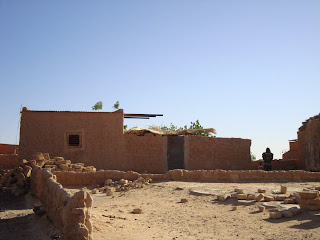Let me preface this with stating that in the states, in an area that I am familiar with, where I speak the language, with clearly marked roads, google maps, GPS, cell phones, and gas stations at which to stop and ask directions, I get lost with remarkable frequency. So when I was faced with finding my way for the first time through the bush from my village to my market town, following unmarked footpaths and with very limited language skills, I was...well... expecting a bit of an adventure.
It seemed that the first logical step would be to go to the mairie, where I spend most of my mornings, and ask the mayor or the SG for directions. Easy, right?
me: "I need to go to the market, but I don't know how to get there..."
mayor: "oh, just go to the doctor's office and ask some of the women there. They'll tell you."
sigh. seriously? I thought,
you can't just tell me first?I walked back towards the doctor's and asked one of my neighbors.
maria: "oh, its easy. you'll see children on the road."
me: "okay. but... which road?"
maria: "the road. the road to the market"
sigh. of course. silly question, really...Back at the mairie, I explained my dilemma to my friend Rabi, the secretary. She took pity on me, walked outside with me to point me in the right direction, explained that if I went to the middle school I would see the path, and repeated the assurance that I would see women and children en route once I got over there.
Great! Perfect! I'm off! I walked over to the middle school, only to find myself standing alone in the desert, wandering in circles, and looking around with increasing amusement for the seemingly invisible path...
After a few minutes, I saw a man on a camel approaching from the direction of my village.
me: Excuse me! Are you going to the market?
him: No. But give me money and I'll take you on my camel.
me: what?
him: MONEY!
sigh.me: no... I don't want to go on your camel. I just want to know which path to take...
him: yes. great. give me money and we'll go.
me: goodbye. (I turned to leave)
him: no, no, wait. Okay, look. It's right over that way. Do you see that woman? you need to go over there.
me: great! thank you!
and, once again, I was off.
I got to the general area where we had seen the women walking, but by the time I got over there they were out of sight. but there was a footpath, or what looked like it might have been a footpath.
I really hope this path doesn't fork... here goes nothing... just a few minutes later I met a woman on the way who had stopped to feed her baby. I introduced myself, and learned that she was also heading for the market (thank God!). We turned a corner and were faced with the dreaded fork-in-the-road, but now with my nwe guide, I was all set. We talked some of the way, but mostly walked along side by side while I listened to her singing some hausa song. The rest of our journey was so peaceful, almost surreal.
deep breath. I can do this.
 "Kungia", my women's leader/Nigerien grandmother, and some of her friends. She's amazing.
"Kungia", my women's leader/Nigerien grandmother, and some of her friends. She's amazing.





